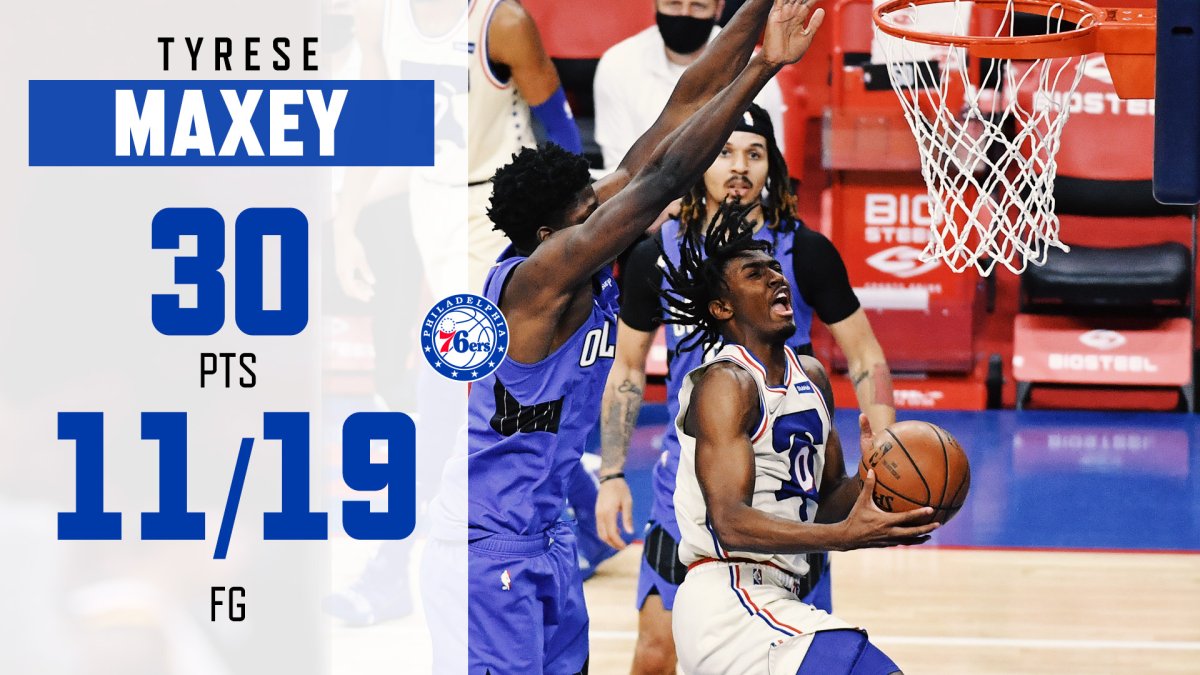
Maxey concluded his rookie regular season with his second 30-point game. According to basketball reference, he became the 11th 76ers rookie ever with multiple 30-point games in a season.
Tyrese Maxey enjoys improving. He loves refining familiar skills, developing new ones, early-morning workouts — all of it.
He’s had a lot to smile about in the second half of his rookie year.
At the start of this season, Maxey showcased touch, range and variety on his floater. His head coach, however, thought Maxey was leaning too much on that tool.
Stay in the game with the latest updates on your beloved Philadelphia sports teams! Sign up here for our All Access Daily newsletter.
“I think it’s clear we got him off that floater,” Doc Rivers said with a laugh after Maxey recorded 30 points, seven rebounds and six assists in the Sixers’ regular-season finale win Sunday over the Magic. “It’s just night and day. … That’s what we worked on early on. Enough with the floater, get to the basket, use your speed. The second thing is use your speed to make passes, as well. And that’s what he’s doing. Early in the year it was a floater, there were no assists, there were turnovers.
“Now he’s attacking the basket, he’s getting to the foul line, he’s finishing at the basket. And when they take it away, he’s spraying the ball out, and that’s terrific. The kid listens. He works his butt off. Extremely coachable. We watched film 10 minutes before the game today on some of the defensive things that he didn’t do last game, and today he came out and did things better. He’s working. He’s good.”
From the start of the season through March 19, Maxey scored 98.2 points per 100 shot attempts and had a 0.78 assist-to-usage ratio, according to Cleaning the Glass. Twenty-nine percent of his shots came at the rim, while 50 percent of his field-goal attempts were two-pointers not at the rim.
Since March 20, Maxey has posted 112.9 points per 100 shot attempts and had a 0.94 assist-to-usage ratio. He’s taken 42 percent of his shots at the rim, and 36 percent of his field-goal attempts have been twos not at the rim.
NBA
All of those numbers back up Rivers’ observations — more aggressive driving, more effective passing and better play across the board. They also align with a moment Maxey described shortly after the All-Star break.
“I think one day Coach pulled me into the office,” Maxey said, “and he told me, go out there and be me. ‘Be you.’ Be myself. I starting thinking about it and I was like, ‘You’re right. I’ve got to go out there and be me.’ Of course play within the team, within the system, but at the end of the day, go out there and be yourself and do what you know you can do.”
For a 20-year-old traveling around the country during a pandemic, playing a condensed 72-game schedule and consuming as much film and knowledge about the NBA as he can, that simplified mindset seems to have worked well.
Maxey has a similarly uncluttered approach when it comes to thinking about what role he might play in the postseason.
“I think my role is to always stay ready,” he said. “Do whatever it takes to win the game. If Coach puts me in and asks me to play defense on somebody, or asks me to get to the rack, or asks me to facilitate for my teammates, then that’s what I’m going to do. If not, I’ll be the biggest cheerleader. I’ll do whatever it takes for us to win. That’s all I have to say to that.”
As Maxey suggested, it’s quite possible his role fluctuates during this postseason. He might not appear on some nights. On other nights, he might play most of the second quarter against college teammate Immanuel Quickley or replace Shake Milton for a spell in the second half if Rivers is seeking an injection of pace and energy.
Maxey knows nothing about the playoffs firsthand yet, but he’s obviously eager to keep learning.
“He just told me he expects a lot of out me,” Maxey said of Rivers. “I just go out there and try to make him happy and do whatever it takes for us to win.”